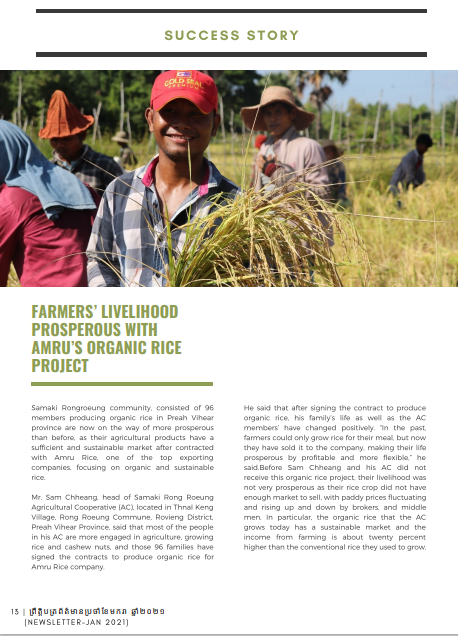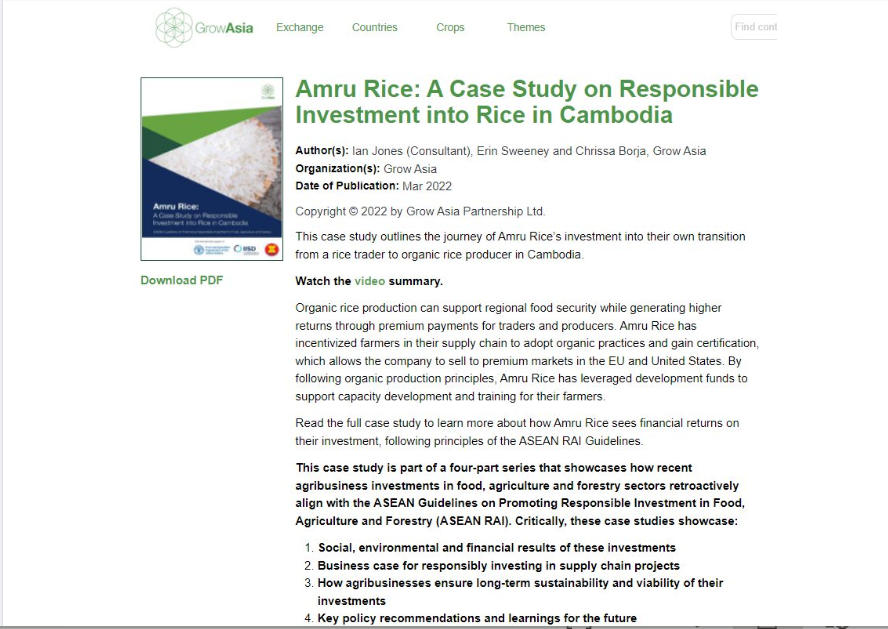Amru Rice innovated the contract farming model in the Cambodian rice sector. By training cooperatives and ensuring farmer compliance to globally-certified organic standards, it has helped smallholder farmers from poor provinces earn more than they would in conventional rice farming in the country. Today, Amru Rice is the largest exporter of organic rice from Cambodia.
How do you tell the stories of the smallholder farmers who work with you?
Amru adopted impact assessment as a measure of how its inclusive business improved the situation of smallholder farmers it partners with in the supply chain. Farmers’ stories tell us how the company has helped them. We publish these stories in our company newsletter. These stories can also be found in our Sustainability Reports; two have been published (GRI website). On top of this, we maintain a Master List of Participating Farmers and Cooperatives in our organic rice supply. We also do baseline and progression surveys to see how the company business had an impact on our smallholder farmer suppliers. This sums up what is captured by individual farmers’ case studies.
How do you collect stories?
For sustainability reporting, the means of verification are individual farmer record books and the EcoCert Audit of farmer compliance to standards. However, our company also do before-and-after case studies through SnapShot surveys using a cellphone-to-data platform (KoboToolBox). Our field staff also ask farmers their story on how our contract farming made an impact. (Find these stories on Facebook or our on our website.)
Do you use storytelling for marketing purposes? How does storytelling affect your sales?
We use storytelling focused mainly on how the business was started and how it grew using the inclusive business model of partnership with farmers. Cambodia has repeatedly won the “world’s best rice” award, so we use this distinction in our marketing and branding approach. Similarly, we also cite Amru’s awards to sell our brand and our company’s best practices. However, we do not have any measure of how this has effectively lead to improved sales. Here is an example of one of our success stories:

How has storytelling helped you expand your social impact and scale up?
Storytelling definitely helped us to be known and, to a certain degree, may have improved demand for our organic food products in the global market. However, we also complemented this with attending product fairs, business matching events and social media marketing. We learned that the story behind the brand and the company is important. It clarifies the pathways that led to where we are. Oftentimes, the person behind the business provides the initial human interest before the product.
A truism of business is that what you sell and what people buy are almost always two different things. Amru is not just selling rice, it is providing healthy food solutions. Our brand is not only what is printed on our product packages, it is also the face of our CEO, as a model for inclusive business. Hence, we rely not just on quality of organically-certified rice product but also on a good record of creating impact for farmers.

You partnered with iBAN to produce an Impact Story. In what way was the Impact Story beneficial for pitches/outreach/to secure new partnerships?
Our CEO has used impact stories to inform buyers and other business networks about what we are doing. We also refer them to videos about our company. We cited and referred to the iBAN Impact Story during our company pitches. However, we do not have a measure of how often it was viewed.
What are your upcoming plans in terms of communicating your stories and impact?
Our company has a newsletter, but textual readership may be waning as source of information. It may be necessary to move on to vlog portals in social media, especially for the consumer market. For our buyers, compact stories through infographics and smart-pitched text, adopted to short videos is now the norm.
I think you understand that info-platforms have shifted from print media to multi-media, that attention spans are now shorter, that the hook to a person’s interest is not merely the visual. Facebook isn’t cool anymore. While Instagram and Twitter have staying power, the young generation are into TikTok, GroupMe, and KikMessenger. Even emails have been eclipsed by the Telegram platform. While our company targets Business Leaders – who may still be informed by traditional business magazines – we also have to be more well known to the general population. Hence, our company’s information strategies must adapt to the times.
Similarly, the changing technology is a challenge even at our supply and production level. In the supply line, we piloted BlocRice for cashless transactions with farmers; we use the cellphone technology for farmer survey; we use IBAT (Integrated Biodiversity Assessment Tool of IFC) to map our supply areas against critical habitat; and we will soon be using ERMA, an online mapping tool for our own foray into carbon sequestration. Our company’s use of info-technology has to shift gear into what best sells our products and our services.